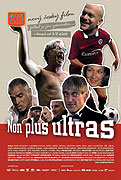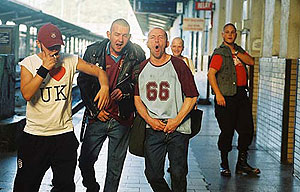Regie:
Jakub SlukaDrehbuch:
Jiří PopelKamera:
Jakub DvorskýMusik:
Radim Hladík st.Besetzung:
David Novotný, Vladimír Dlouhý, Matěj Hádek, Karel Zima, Michal Novotný, Jana Hlaváčová, Karolína Kaiserová, Oldřich Kaiser, Karel Poborský, Jiří Lábus (mehr)Inhalte(1)
A humorous, brief look at the lives of a few men, some of whom have grown prematurely old, others of whom have yet to grow up. The characters are real, they live among us. It's just that they no longer seem as enthusiastic about their favorite activity - soccer hooliganism - as they used to be. Beanpole, a middle-aged loner, finds himself in crisis one Sunday afternoon. His own fans threaten to assault him before a game. Beefy, the unwritten leader of a sizeable group of fans, comes to his aid. Thanks to him, Beanpole finds himself in new surroundings, and he observes with detachment the group of aging soccer hooligans who have accepted him among them. (Verleiher-Text)
(mehr)Kritiken (4)
So wie viele andere war ich nicht ganz in der Lage, den Film von Genre her einzuordnen und den Grund, den Sinn bzw. die Pointe zu entdecken. Vor allem habe ich überhaupt nicht verstanden, warum die von Vladimír Dlouhý gespielte Figur in die Handlung hineinkomponiert wurde. Ich muss dem Film jedoch ein paar gelungene Momente zugute rechnen, zu denen traditionell die Sketche des eingespielten Duos Kaiser-Lábus zählen.
()
Ein vergeblicher Versuch des Filmes ein soziales Drama / eine Komödie zu kreieren. Die Absicht ist ja noch lobenswert, aber die Ausführung schweift an allem vorbei, was aus den Non Plus Ultras zumindest generell einen relevanten Film machen könnte. Das Drehbuch ist schrecklich naiv, obwohl es nicht vollkommen neben der Kappe stilisiert ist, jedoch strukturell werden hier nur vergeblich "Filme aus dem realen Leben" nachgeahmt. Es kommt mir wie ein typischer Versuch im Sinne von "Stellen wir uns also vor, wie diese Fußball Jungens so leben." Das sich hieraus ergebende Pappprodukt überrascht nicht allzu sehr. Er ist vollkommen daneben, wirkt albern und unglaubwürdig sowie nur allzu sehr wie eine Art Estrade. Die klassische Parallele Realität einer tschechischen Komödie, außerhalb von Beziehungen, außerhalb der Psychologie, außerhalb des Humor, außerhalb des Spiels. Ein Plus gibt´s da nur für die soliden Schauspieler.
()
The sympathetic environment of the pub was about the only thing I liked about this. I’ll take the director's word for it that this was just a set of scenes taken from life. Moreover, his contemplation that the state does not care about Czech cinema was true. He also cast a lot of good actors - Hlaváčová, Konvalinková... and even Hála. But why he didn't think through the concept of the script is a mystery to me.
()
I don't sympathize with bald hooligans whose only entertainment is going to the stadium and causing as much trouble as possible. I strongly doubt the intelligence of these people. I don't know what director Jakub Sluka's intention was when he was deciding who he was making the film for. Either for the hooligans to feel good that they are so great that movies are made about them, or for the "rest of us" and wanted to showcase to us the stupidity of these people. Throughout whole movie I felt like Sluka was trying to play both sides. Unfortunately, he did so unevenly, because there is a certain sycophancy toward the Ultras. The average viewer can grasp the film and find in it what the director intended to convey. That is, what he already knows and does not need to be proven. That hooligans are morons who have nothing else to do. There is, however, a certain effort to make all the characters less black and white. The boss of the party, Jirka, is quite a likable character who has been "given the gift of thinking." Unfortunately, Sluka compensates through his character for the shortcomings and monotony of all the other characters too much. David Novotný can’t carry the film as an actor even if he tries his best. He does his best, and his charisma radiates at every step, but he is simply not enough. Jiří Lábus played a really disgusting role. He was an extremely unsympathetic character, and I tried the whole film to find at least something to like about him. Moreover, Lábus overacts in an unhealthy way, which is quite surprising coming from him. Not explaining the behavior of the innkeeper in Oldřich Kaiser's excellent performance seems like another mistake by Sluka against logic. Overall, the film would have benefited from an extra fifteen to twenty minutes. I would try to stomach it, and then maybe something could be inferred from the film. This way it feels like the editor's scissors may have worked a little too hard. Or maybe the director didn't get it right...?
()


Werbung